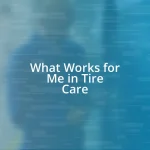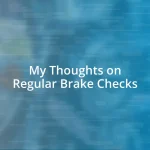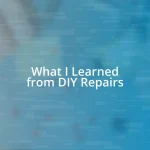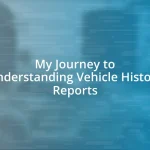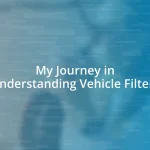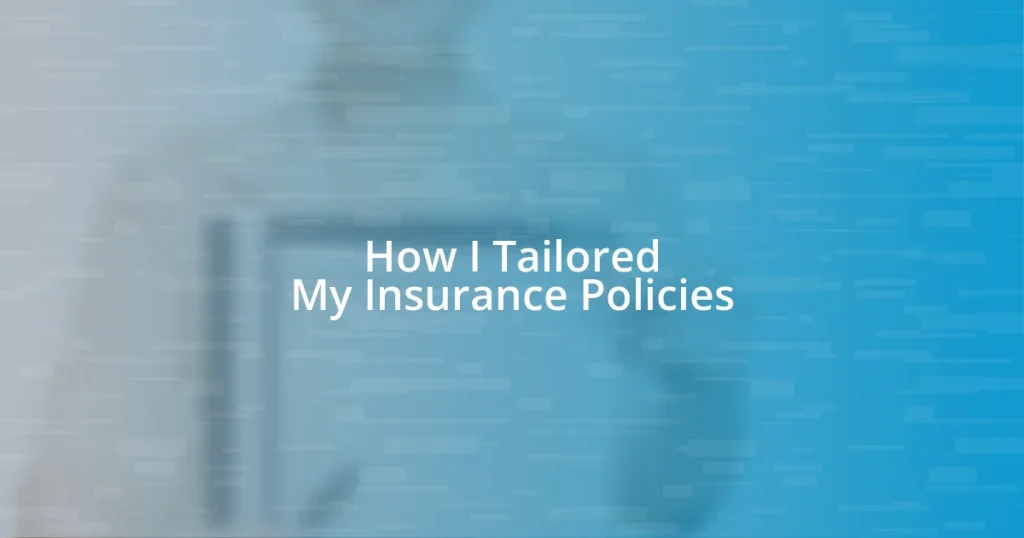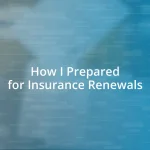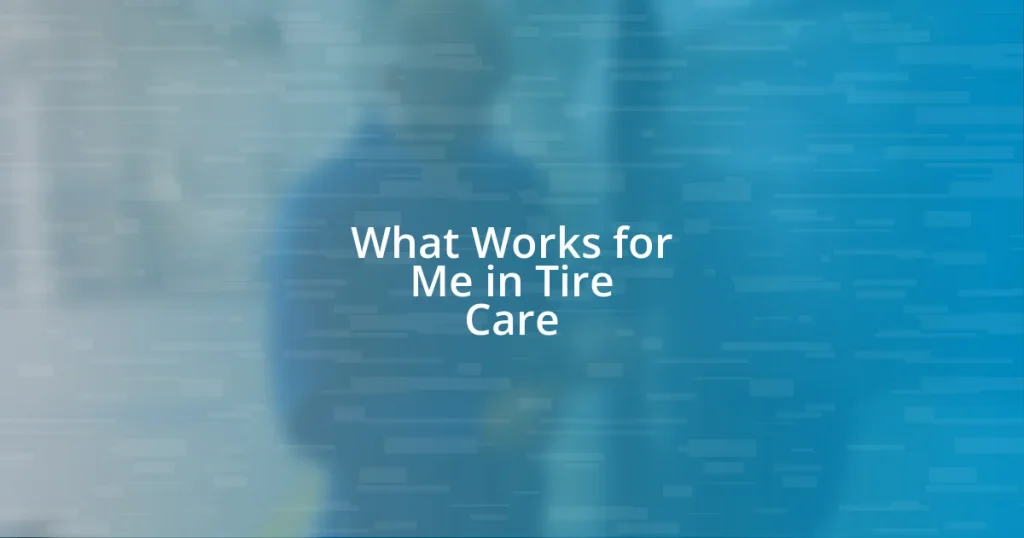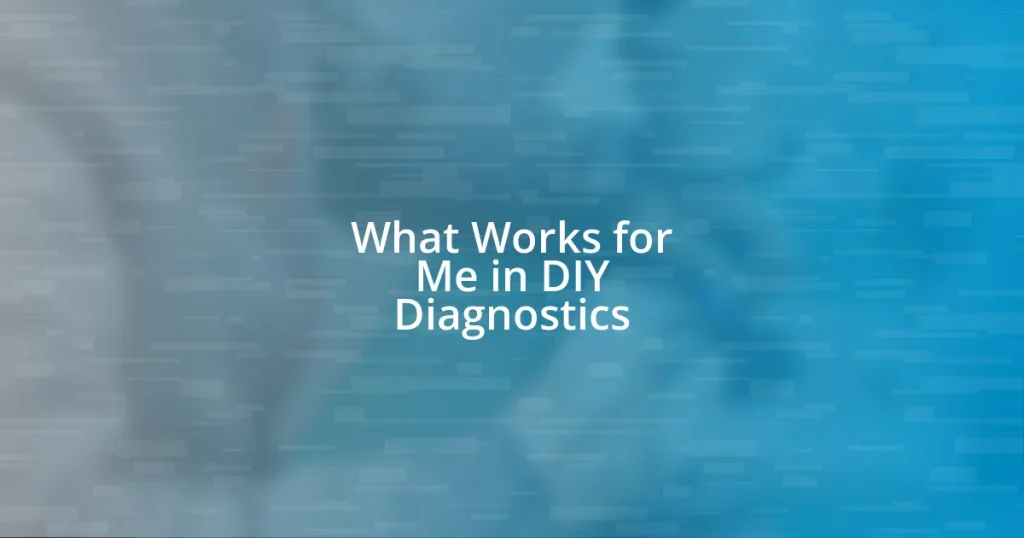Key takeaways:
- Understanding personal insurance needs is essential; life changes like family expansion or job transitions trigger necessary coverage reassessments.
- Identifying coverage gaps reveals vulnerabilities; it’s vital to regularly review policies for potential risks and changes in lifestyle or technology.
- Consulting with insurance experts enhances understanding and helps tailor coverage; proactive discussions can uncover valuable options previously overlooked.
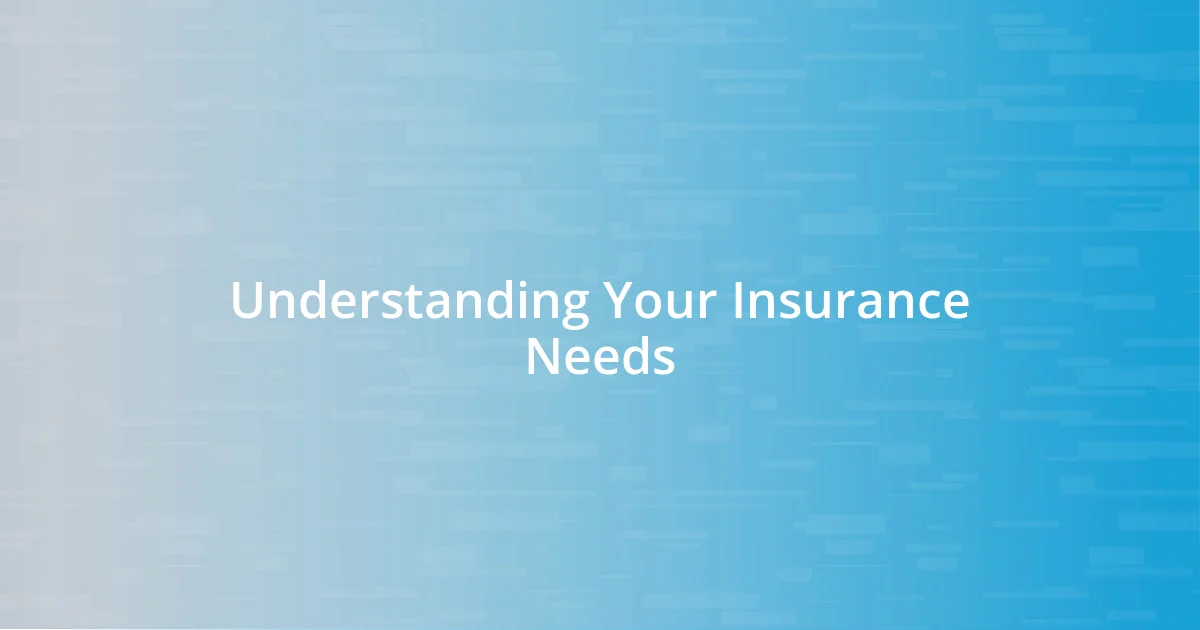
Understanding Your Insurance Needs
When I started reviewing my insurance policies, I realized that truly understanding my needs meant thinking about my unique circumstances. For instance, when my family grew, I felt a wave of responsibility wash over me; suddenly, life insurance felt not just prudent but essential. Have you ever paused to consider how your current situation—like having a new job or moving to a new city—affects what you really need in terms of coverage?
As I dug deeper, I began to reflect on my lifestyle and hobbies. I love hiking and frequently venture into the great outdoors, which led me to reconsider whether my health insurance adequately covered potential accidents or injuries. It made me wonder: are there passions or activities in your life that might require a closer look at your coverage options?
Ultimately, understanding my insurance needs became a personal journey of discovery. It was about more than just numbers; it was about securing peace of mind for me and my loved ones. I urge you to take a moment and think—what keeps you up at night regarding your insurance? A clear picture of your priorities can transform how you tailor your policies.
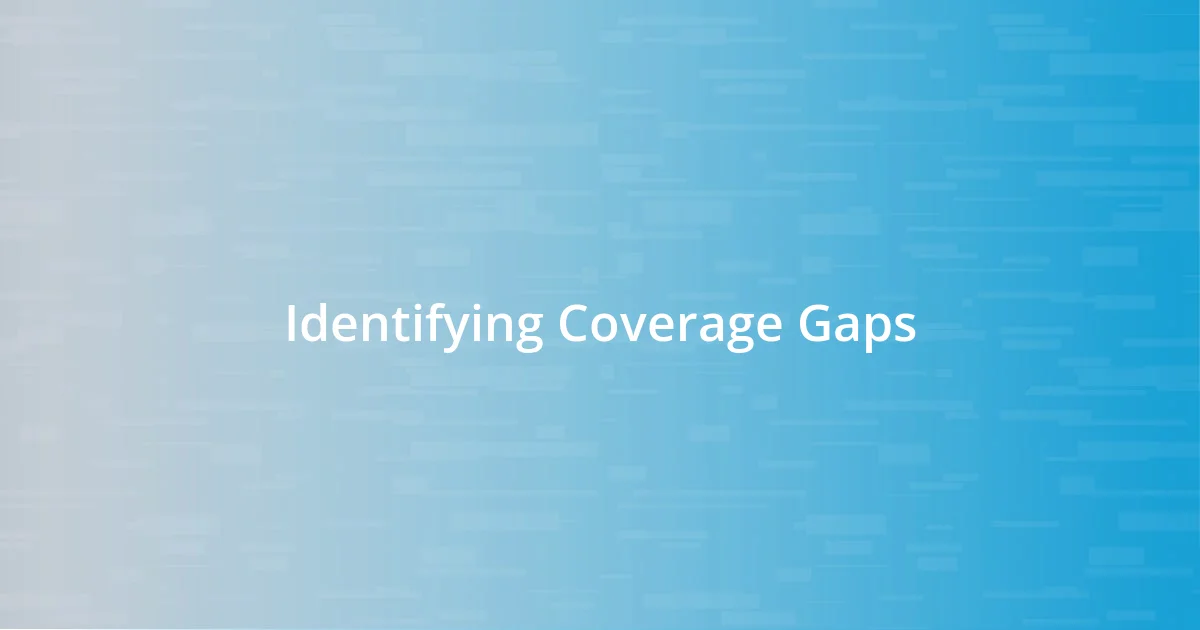
Identifying Coverage Gaps
Identifying coverage gaps in my insurance policies was an eye-opening process. I vividly remember the sinking feeling I had when I realized that my homeowner’s insurance didn’t cover theft of personal property outside the home, like my expensive camera gear I often took on trips. It’s crucial to assess these areas where life’s unpredictability might leave you vulnerable—have you thought about the specifics of what your policy covers?
One poignant moment came when I attended a friend’s seminar on expanding coverage for freelancers. It struck me that my liability insurance didn’t consider all the contract work I was taking on. That realization made my heart race! I learned that some professions come with unexpected risks that need to be addressed, leading me to rethink my entire approach to coverage. Don’t overlook your profession’s unique hazards; it could save you from future headaches.
Additionally, it became clear to me that reviewing coverage gaps isn’t a one-and-done task; it’s an ongoing journey. The changes in technology, vehicle models, and even personal circumstances—like buying a new car—must always be considered. I have a friend who faced a hefty bill after an accident because her policy didn’t account for the latest safety features of her new car. Regularly revisiting your policies keeps you prepared for these life changes; it can make all the difference when you need to file a claim.
| Type of Coverage | Common Gaps |
|---|---|
| Homeowner’s Insurance | Theft outside the home, natural disasters |
| Health Insurance | Out-of-network services, specific conditions |
| Auto Insurance | New safety features, ride-sharing activities |
| Liability Insurance | Freelance or contract work risks |
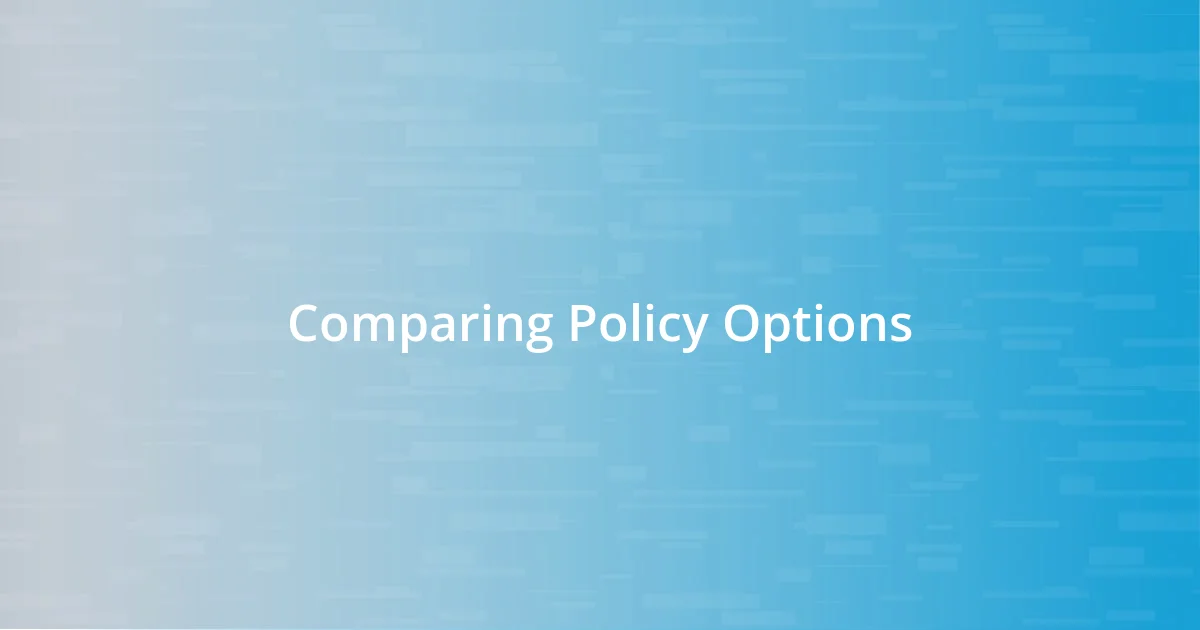
Comparing Policy Options
When I started to compare policy options, I was somewhat overwhelmed by the sheer volume of choices out there. It felt like diving into an ocean of information, and I knew I had to navigate it carefully. I remember sitting at my kitchen table, surrounded by brochures from different companies, feeling a mix of excitement and confusion. I realized that laying out key features side by side would help clear the fog. Here are some aspects I focused on:
- Coverage Limits: Understanding how much protection each policy offers.
- Premium Costs: Comparing monthly payments versus the benefits provided.
- Deductibles: Analyzing how much I’d pay out-of-pocket before coverage kicks in.
- Exclusions: Identifying what’s specifically not covered by each option.
- Customer Reviews: Researching feedback on claim processes and customer service.
In another session at the local coffee shop, I dived deeper, examining the fine print of my policy options. That’s when I had a lightbulb moment—one policy offered perks I hadn’t even considered, like roadside assistance and rental car reimbursement, which were often must-haves for me. The key was not just in the numbers but in recognizing the practical benefits that matched my lifestyle. It prompted me to ask: what additional features can provide real value in my day-to-day life? Balancing my priorities with potential policy advantages ultimately seemed to be the magic formula in my decision-making process.
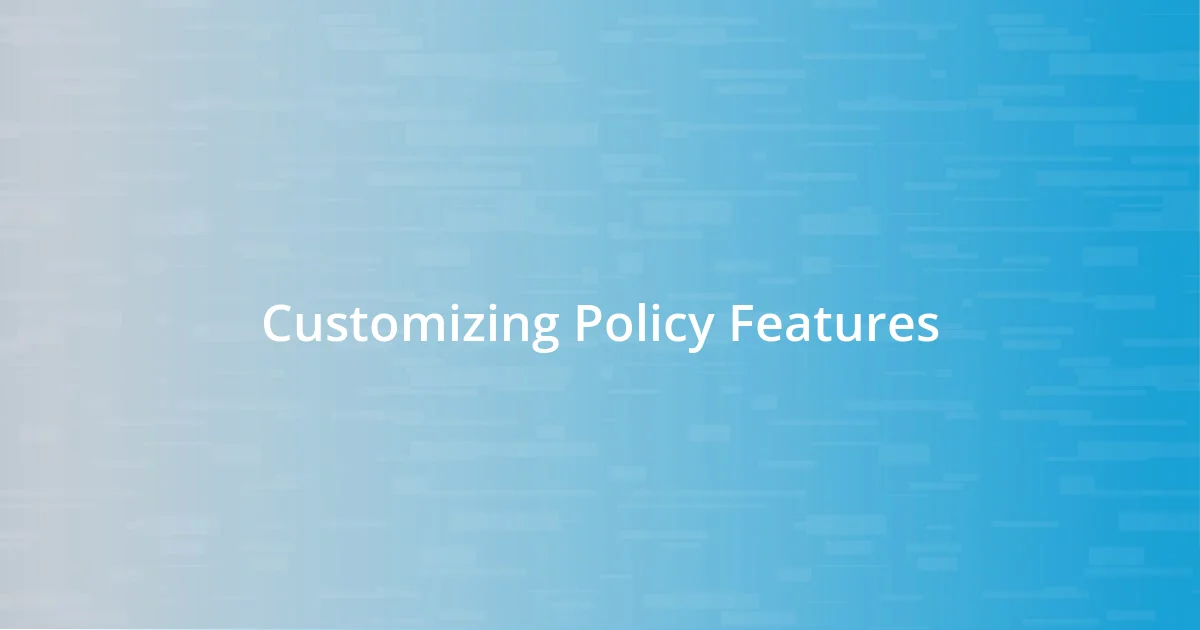
Customizing Policy Features
When it came to customizing policy features, I learned that personalizing benefits is key. For instance, I included options for personal property coverage that extended beyond my home. I remember chatting with my insurance agent about the importance of adding coverage for my high-value items, like my golf clubs and electronics. I had a sinking realization that without these features, I could lose a lot not just financially, but emotionally too.
I also found it crucial to evaluate the additional services that come with my policies. One day, amidst a particularly hectic week, I noticed how much a rental car provision could save me during an unexpected repair. This feature turned out to be a lifesaver when my car was in the shop for two weeks! How often do we think about the little conveniences that truly make life easier when something goes wrong? Selecting these features allowed me to tailor my policies to my lifestyle rather than fitting my life to the policies.
Moreover, I discovered that many insurers offer bundle discounts for customizing multiple policies under one contract. By combining my auto and home insurance, not only did I save money, but I also streamlined my management of claims and payments. The simplicity was refreshing! Have you explored how bundling could enhance your overall coverage while keeping costs down? Customizing policy features isn’t just about protecting your assets; it’s about crafting a safety net that feels tailor-made for your life’s realities.
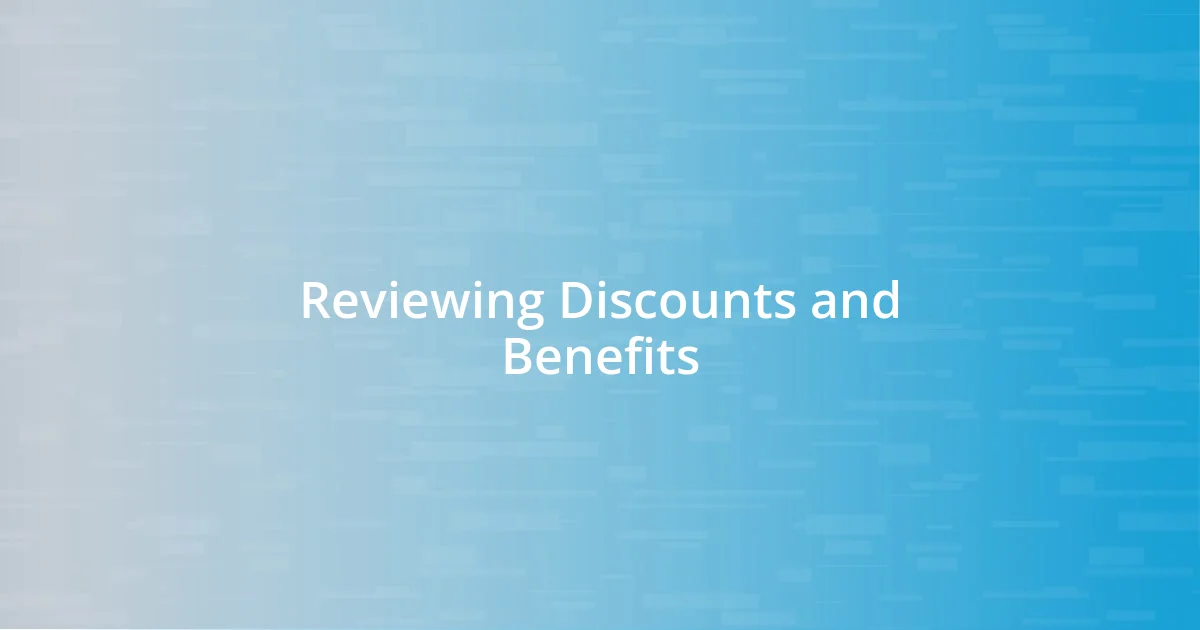
Reviewing Discounts and Benefits
As I continued my exploration of insurance, I found that reviewing available discounts was like uncovering hidden treasures. One morning, while sipping my coffee, I discovered a discount for a safe driving record. It instantly caught my attention. I’ve always prided myself on being a cautious driver, so receiving financial recognition for that felt rewarding. I couldn’t help but smile, realizing that my good habits directly impacted my bottom line.
Then, I stumbled upon loyalty discounts that pertained to my long-standing relationship with my insurer. It struck me that staying with a company pays off beyond just a sense of familiarity. I recalled how my agent reached out after a few years to suggest potential cost reductions, and I thought: wouldn’t everyone want an agent who actively looks out for their interests? I found that these discounts not only lessened my premiums but also fostered a sense of trust and community, making me feel valued as a policyholder.
Looking into bundled policies was another important aspect of my review process. After doing the math, I realized bundling my home and auto insurance offered significant savings. I remember having a light bulb moment when I saw how much I could save annually while simplifying my paperwork. This got me thinking: why complicate matters when a streamlined approach offers both efficiency and savings? It was a win-win that made me feel smarter about my choices, and frankly, who doesn’t want to feel clever with their money?
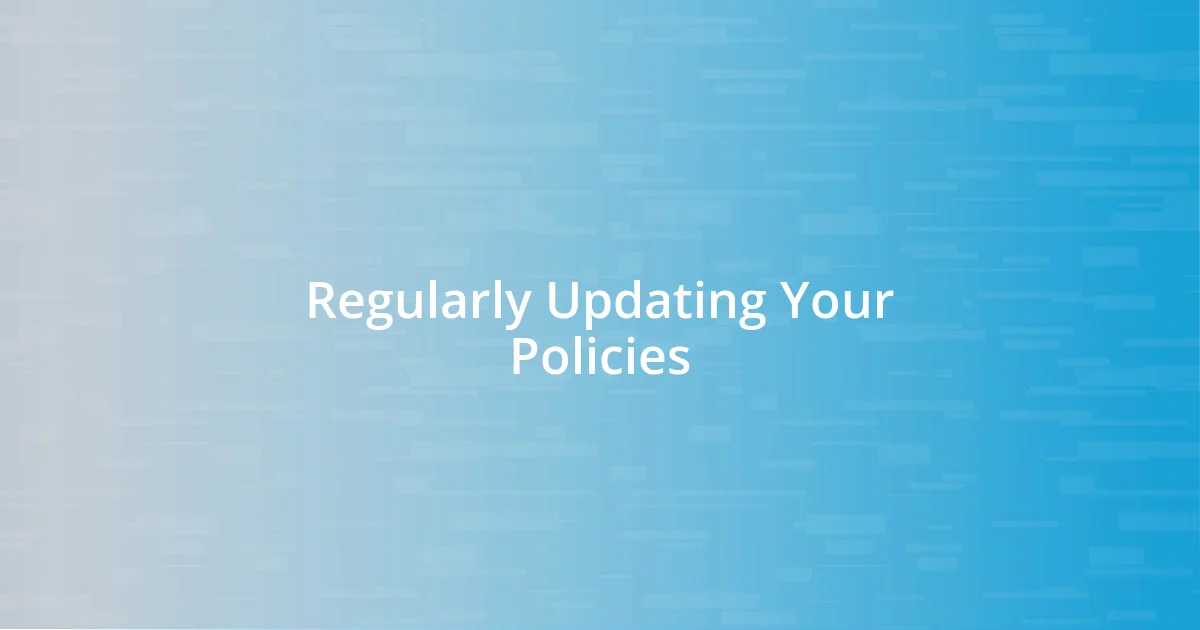
Regularly Updating Your Policies
Keeping my insurance policies updated has been an eye-opener for me. I remember the day I stumbled across my old auto policy. I hadn’t touched it in ages and was shocked to find it still reflected an old vehicle of mine. It hit me that by not updating my information regularly, I was potentially overpaying for coverage I didn’t even need. Have you ever paused to think about how many life changes can affect your insurance needs?
One particular instance stands out where updating my policies made all the difference. After moving to a new neighborhood, I decided to revisit my homeowner’s insurance. I realized that the area had different risks, like higher theft rates. Talking with my agent about this change helped me secure additional features, including better coverage for theft, and it offered me peace of mind knowing I was appropriately protected.
Then there was a moment of sheer panic when I thought about my growing family. With the arrival of our baby, I knew I couldn’t afford to postpone a review any longer. I sat down, pen in hand, ready to go through my life insurance policy. It was a surreal yet reassuring experience, realizing that updating my policies wasn’t just about paperwork; it was about safeguarding my family’s future, ensuring they’d be taken care of no matter what. How comforting is it to know you’ve taken steps to secure your loved ones?

Consulting with Insurance Experts
Consulting with insurance experts has truly shaped my understanding of my needs. I vividly remember the first time I sat down with an agent. As we discussed various policies, I realized just how much I didn’t know. Have you ever felt that rush of clarity when someone takes the time to explain complex concepts in simple terms? I did, and it opened my eyes to personalized coverage options tailored just for me.
One instance that stands out was when I consulted with a specialist about my homeowner’s insurance. I mentioned my concerns about potential flooding, and they recommended additional coverage that I hadn’t even considered. This proactive approach not only eased my worries but also highlighted the value of having someone knowledgeable in my corner. I felt a mix of relief and empowerment, knowing I was making informed decisions and protecting what mattered most.
After that meeting, I learned the importance of asking questions. The more I engaged, the deeper I understood my policies. Have you thought about what questions you’d ask an insurance expert? I started with my coverage limits and ended up discussing my long-term goals. That experience taught me that consulting with experts isn’t just about securing a policy; it’s about building a relationship grounded in trust and mutual understanding.

